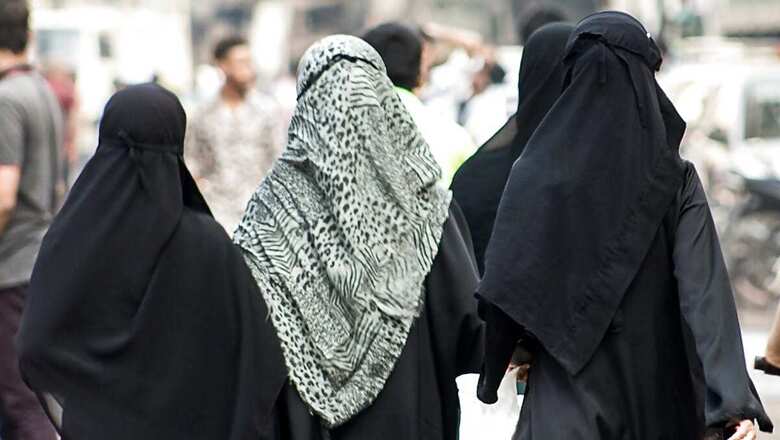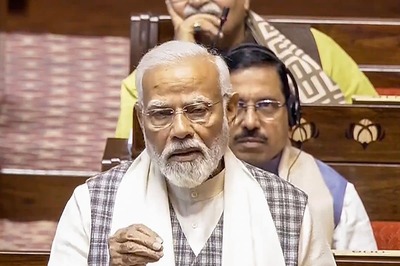
views
Apart from the dubious origins of the law that protects Sharia in India, the legal grounds on which the Sharia law is protected are thin and flimsy. Any other law on the statute books would have been challenged in courts and eventually quashed for being vague, arbitrary, and unreasonable. It’s one thing for the families to lead their personal lives through Sharia but it’s completely a different ball game for the courts to protect and guard such practises.
Here are five reasons why India should not grant any protection to the Sharia law in the country:
1. Shariat Application Act, 1937, is vague, arbitrary, and unreasonable: The entire fulcrum of the existence of the Muslim personal law in India is the Shariat Application Act, 1937. The pre-Independence Act cannot survive the constitutional judicial test of democratic India. The entire Act, on various counts, is vague, arbitrary and unreasonable.
The Act is declaratory in nature, which means it simply makes a declaration that Sharia law shall apply to Muslims. It does not define its objective, scope or welfare measure that it intends to implement. The Act is a wall that has been placed between the community law and the Constitution without any reasonable basis. It’s a pre-Independence Act but the fact that it has survived in independent India is a legal conundrum.
2. No exhaustive definition of what Sharia is: The Shariat Application Act, 1937, lays down that the various aspects of lives of Muslims pertaining to marriage, divorce, inheritance, adoption, and others shall be governed by Sharia. The barely four-page-long, pre-Independence Act stands on thin legal grounds. The core term of the Act — Sharia — is undefined. Neither does the Act lay down any sources that must be relied upon when the word is interpreted.
The word ‘Sharia law’ has been left open-ended. The term is at the mercy of the religious clergy to be used broadly or narrowly. This has also allowed distortion, misinformation, and propagation of evil practices under the cloak of religion. Though Sharia forms the core concept of the 1937 Act, its sources, origin, scope and why it must be protected remain unspecified. The Act at the outset is vague. It’s prone to misuse and abuse. Vagueness and arbitrariness are the key grounds under which various laws passed by the country have been set aside.
3. Creation of class of ‘Muslims’, no clear objective, and without reasonable nexus: The Shariat Application Act is for the protection of Muslim personal law in India. While the existence of such an Act could be well understood in the pre-Independence era, under the British rule, its survival in the statute books today raises several questions.
When any special class is created and identified in a statute, it must be identified for a social objective. For example, notified Scheduled Castes and Scheduled Tribes have been identified and given certain protections and privileges owing to their historical social and economic disempowerment. Similarly, if the Muslims as a class have been identified under this Act, then there must be a welfare aim for the state to justify such classification. The protection and imposition of Muslim personal law on all Muslims does not stand the legal test. The legal test under which the creation of a special class and grant of special rights or privileges ought to be directly proportional to the welfare measure sought to be implemented is not satisfied by the Shariat Application Act.
4. Protection to Sharia violates equality of religion before law: All religions ought to be treated alike and the State shall not have preference for one religion over another. The special protection to any one religious code or practice is clearly violative of equality of all religions before law. It is true that the state can make special provisions for the protection of minorities, but those provisions are for the welfare of communities. Shariat Application Act, 1937, is not a welfare legislation. It merely makes a declaration that Muslims shall be governed by Sharia. The Act grants a special immunity to Sharia practices without any welfarist objective.
5. Law cannot sanction discrimination: Diversity is an overstretched term. It is often used to protect archaic, discriminatory practises against women. So, it is unfortunate when courts grant legal sanctity to the marriage of a 15-year-old Muslim girl child because the Sharia law allows it. Such anomaly is allowed in the face of the provisions of the various laws framed for protection of children from sexual abuse.
Muslim law was the earliest proponent to grant property rights to women — much before English law or the Hindu law but the regressive turn that Islamic law has taken in the last 300 years cannot be ignored. An Act or statue, however old, cannot give legal sanction to medieval practices. It cannot be used as a tool to perpetuate discrimination.



















Comments
0 comment